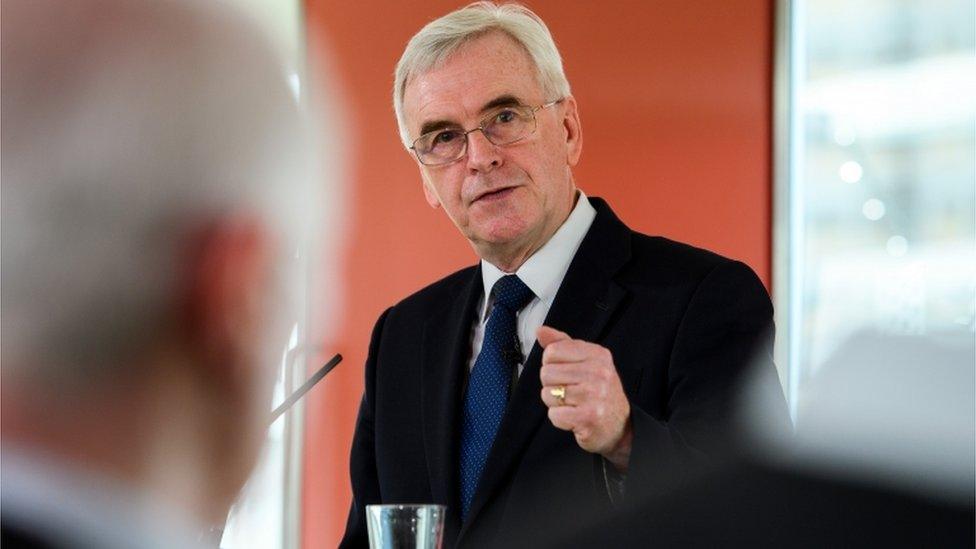Labour says £1m earners should publish tax returns
- Published
- comments

Taxpayers whose incomes top £1m a year would be forced to make their tax records public under Labour, shadow chancellor John McDonnell has said.
He claimed the measure, inspired by Norway and Sweden, would restore trust in the system and reduce tax avoidance.
He also called for a specific chunk of taxes raised to be "hypothecated" - earmarked - for the NHS.
The Conservatives said Labour Leader Jeremy Corbyn had said he did not favour a hypothecated tax.
Chancellor Philip Hammond will deliver his first full budget next Wednesday.
Outlining his thinking in a pre-Budget speech, Mr McDonnell urged the chancellor to "reverse the £70bn giveaway to the super-rich and giant corporations between now and 2021".
He said under a Labour government "there'll be no place to hide for tax avoiders".
'Urgent need for cash'
"Building on the successful Nordic model, we'll introduce legislation to make public the tax returns of those earning over £1m," he said.
"Transparency and fairness is at the heart of building a decent, open society. This will help restore public trust in the tax system and help clampdown on any avoidance."
Mr McDonnell said Mr Hammond must give the NHS and social care "an urgent injection of cash" when he delivers his first Budget next week.
He said the chancellor cannot continue to claim credit for improving economic growth figures while leaving health and social care without the funds they need.
"The experience on the ground of patients, doctors and nurses is of a treasured institution already drifting into the greatest crisis in its history," he said.
"Current plans from the government do not come anywhere near close to addressing the scale of the crisis, so it is essential that they now bring forward plans to close the funding gap if we do not want to lose our NHS."
'End discrimination'
He urged the government to appoint a politically neutral body, such as the Office for Budget Responsibility, to assess the levels of funding needed for the NHS in the long term, with 10-year budgets that show taxpayers their contributions are well-spent.
"Hypothecation, allocating taxes raised to specific purposes, can make absolutely clear where tax money is being spent," he said.
He accused the Conservatives of adding £750bn to the national debt since 2010, while at the same time imposing the first spending cuts on schools for 40 years and cuts to social care amounting to £4.5bn since 2010 that "have brought the system to the brink of collapse".
Mr McDonnell also called on Mr Hammond to end the "discrimination" which had seen cuts to public services "disproportionately" affect women.
He said "the cruel £3.7bn cut to Personal Independence Payment for disabled people must be halted", and he pledged that Labour would introduce a £10-an-hour Real Living Wage "to make sure work always pays fairly".
In response, the Conservatives said Mr McDonnell's speech highlighted divisions within Labour on the economy - pointing to comments made by Labour Leader Jeremy Corbyn about hypothecated taxes.
A Conservative spokesman said: "Labour have today shown what a shambles they are - with the shadow chancellor suggesting a way of funding the NHS the Labour leader says won't work.
"The truth is that a strong NHS needs a strong economy, and only a Conservative government can deliver that."
In January, Mr Corbyn told the BBC's Andrew Marr Show: "I am not one that's generally in favour of hypothecated taxation but I'm prepared to consider it and look at it. The party will obviously consider it and look at it."
Asked if there would be a specific tax to raise money for the NHS under Labour, he replied: "We would guarantee the funding for the NHS. Whether we'd have a specific tax I doubt, but I'm prepared to consider it and discuss it as I'm sure all my colleagues are. But if you go down the road of hypothecated taxation then you're going to do hypothecated taxation for every other service. That's an issue."